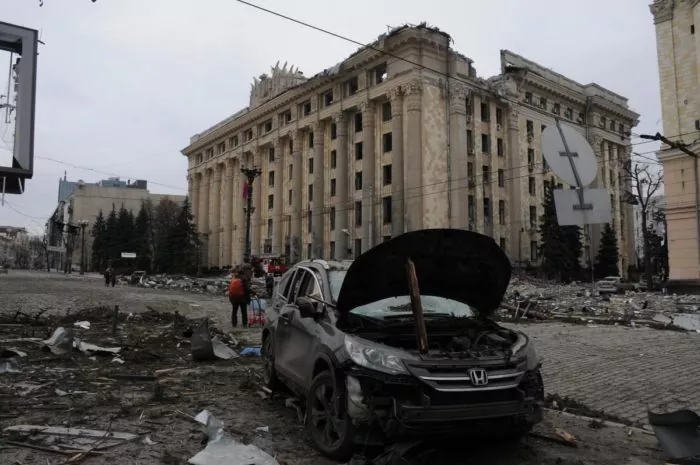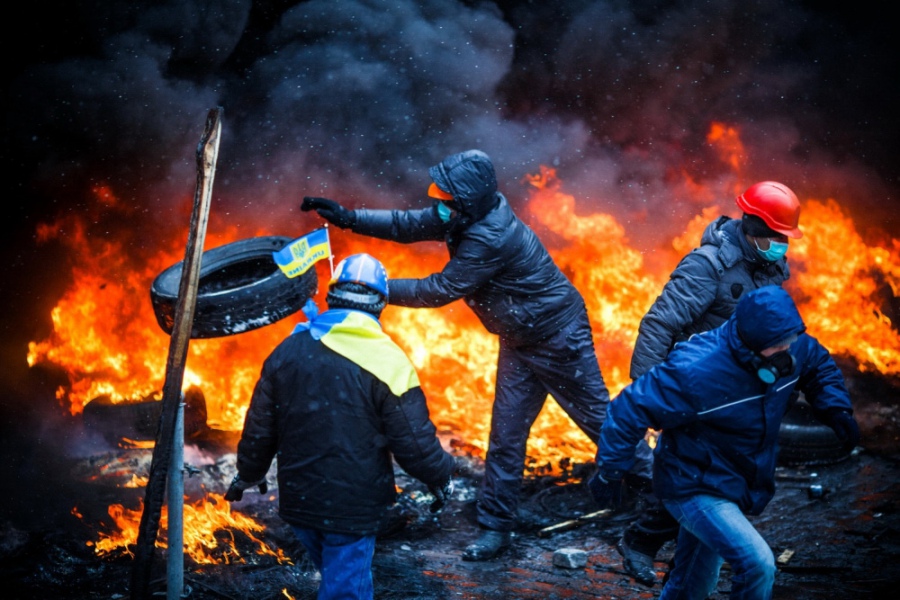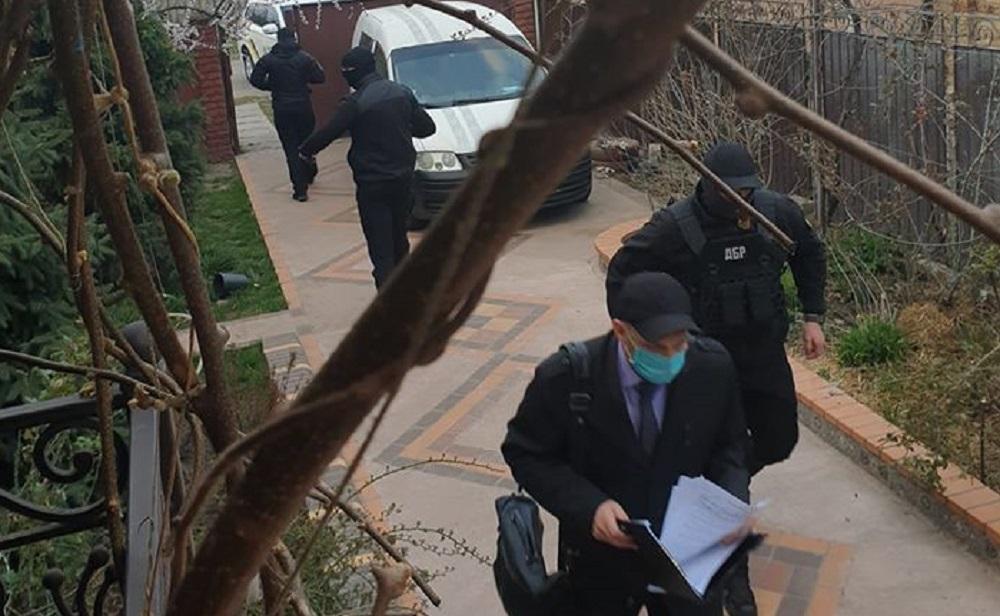They asked me about it several times, whether it was new acquaintances visiting me from another city for the first time, for whom I gave a historical tour, or old local friends getting together for a walk over wine or coffee. Sooner or later, the question was asked: What is your favorite place in this city?
The more such meetings I had, he quicker and more decisively I answered: Maidan Svobody (Freedom Square). Some, as if knowing the answer in advance, asked me right there, on the spot, or somewhere nearby. Those who were farther away from it but had free time and could walk there, set off immediately. If the square wasn't filled with decorations for another holiday, I would lead them to the very center, stop, and silently indicate what my answer was. Only after that, I would start explaining in more detail why this particular place in Kharkiv.
The same holds true today. If you go to the center of Maidan Svobody, you will notice that nothing has changed in more than six months. On the contrary, it has gained even more significance. You take a slow and careful look around, and you're hit with a medley of memories. This appears to be your first memory: you get off the trolley bus at the last stop with your mother, father, and brother, and you see a long, gray fence that seems to go on forever, and behind you is the same gray Kharkiv skyscraper.
History repeating: I evacuated my family from war just like my grandfather in 1941
A few days ago, I met with one of the city’s local volunteers, who opened a bar in a basement at the beginning of summer, where charity concerts and poetry evenings are now held. He told me about three journalists from Germany and the Netherlands who came to film the war in Eastern Europe. He needed to drive them to Northern Saltivka and the de-occupied parts of the region. Cut.
Before my eyes is the hotel that emerged in place of the fence that went on forever. I notice how much glass it still has. "Lucky this hotel, no arrivals nearby," says the first voice behind you. "Well, yes. Or just an under-the-table deal," replies another. Cut.
The year is 2008, and the legendary rock band Queen is performing, with tens of thousands of people jostling and the entire city singing in unison that we are the champions and will triumph. Cut.
The year is 2014, the beginning of April. We are standing in a crowd opposite the Regional State Administration, which was stormed and occupied by Russian sellouts a month ago. We are singing victory songs, but now our own. Around the square and in the courtyards, police vans filled with special forces are parked. A moment. A flash. Two waves crash into each other, shots are heard, bottles filled with an incendiary mixture fall at our feet. You are glad that the sparks go out in flight. Cut.
Approximately at the same spot where the Molotov cocktail fell, a rock concert in support of the "Everything for Victory" tent is taking place, which someone tried to set on fire the night before. The summer sun is fiercely burning the concerned citizens who have gathered to express their position. Cut.
There was tension in the air on the evening of 22 February 2022, two days before the full-scale war began. Even those who have previously remained on the sidelines attend the rallies. Everyone is looking for unity and support, if not for explanations and answers. You get photos and videos of the performance from the people you went to the Staryy Khem pub with after the rally. Cut.

Kharkiv Oblast State Administration building, located in front of Freedom Square, after Russian missile attacks on 1 March 2022 when 24 people were killed. Photo source: UnianMissile attacks on the Regional State Administration building last March. That morning, I didn't make it there because volunteers asked for help at another location. I couldn't make it, but my brother was there. I've sat through the longest dial tones in my life; each one seems to last forever. The first eternity... The second eternity... The third... Reality in front of my eyes is focused and blurred at the same time. Then, finally "Hello! Yes, I'm alive. That's all. Later." In the evening, with my battered and patched-up brother in the hospital, we take a silly selfie. It's hard for him to laugh, his ribs hurt, but through the pain, he still laughs with us. Cut.
Three months later, we're driving down the city's main street. The rumble of the cobblestones forces us to speak much louder: "I've always liked cobblestones, but I can't get used to this sound. Every time, my first thought is -- a plane." My brother agrees and turns onto a paved street.
The medley of memories is interrupted by the phrase, “Mister, curfew starts in half an hour!” Returning to reality, you notice a patrol officer who has stopped next to you in the center of the square in a service vehicle and is addressing you through an open window. “Yes, thank you, I remember. I'm on my way home: it's not far from here," you say. At the same time, you tell yourself, "No, this is not a square; Specifically, Maidan Svobody (Freedom Square)." The patrol moves on – and you realize that their headlights are the only source of light around, for the entire space. And that you’ve never seen this square like this before. And the stars hanging above you in the night sky in the heart of the city – you're also seeing them for the first time. You continue towards your apartment, following them.
is an online anthology of essays by Ukrainian intellectuals about the Russian invasion of Ukraine. One hundred Ukrainian authors recount their own experiences, impressions, observations, and feelings in 100 texts. The anthology's creation takes place within the framework of the USAID-backed, Deepening the Internal Cultural Dialogue in Ukraine project. ©Meridian Czernowitz.
Related:
- They thought we are cave people: stereotypes Ukrainian refugees face in Europe
- I’m done believing we’re the stupid ones, Ukrainian soldier tells Jonathan Franzen
- Lviv Garrison Church chaplains help soldiers find God amid war. And a pair of good boots
- Ukrainian theology professor turned sniper tells how to hunt for Russian invaders
- I am a researcher, not a military man. But there is war…
- “Dearest daughter, it’s total Hell. Death is everywhere” – Ukrainian father on the frontline
- Russian occupiers launch war on Ukrainian history, burning books and destroying archives
- The Russian invasion of Ukraine is an assault on the very concept of freedom
- From retiree to millionaire: 7 stories of heroism during the war in…
- The Russian invasion of Ukraine is an assault on the very concept of freedom





